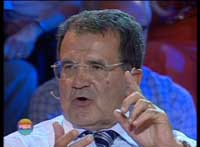Prodi claims narrow victory
Center-left challenger Romano Prodi claimed victory by the narrowest of margins Tuesday in Italy 's parliamentary elections, but Premier Silvio Berlusconi's forces demanded a recount in one chamber as Italy 's election failed to deliver a clear verdict. The outcome of the bitterly contested election hung on the Tuesday's counting of votes cast by Italians living overseas. Prodi's coalition claimed four of the six seats, giving it the necessary margin for victory, but official results hadn't yet been released.

Final returns Tuesday showed Prodi winning the lower Chamber of Deputies by one tenth of a percentage point 49.8 to 49.7 percent. Under Italian electoral law, 55 percent of seats are awarded to the overall winner regardless of the scale of victory, giving Prodi's forces 340 seats in the 630-member lower house. All eyes were on the Senate, however, which Prodi also needed to win to form a government. The razor-thin margins raised the prospect of a political crisis in which the two claimants might each control a different house of parliament.
According to official returns, Berlusconi's conservative allies held a one-seat advantage in the upper Senate, with 155 seats to Prodi's 154. But while the votes cast abroad were being counted, Prodi's coordinator for Italians living abroad, Franco Danieli, told a press conference that the coalition had garnered four of the six seats.
"There are conditions to create a government and to govern, even if the country is divided in two," center-left leader Piero Fassino said on a radio program Tuesday. Prodi claimed victory well before the Senate figures were in, saying in the early hours: "Until the very end we were left in suspense, but in the end victory has arrived."
"We have won, and now we have to start working to implement our program and unify the country," he told supporters. Prodi's allies conceded after his announcement that results in the Senate were still not complete. But center-left leader Francesco Rutelli was quoted as saying that the center-left was heading toward victory in the Senate as well.
Berlusconi's spokesman, Paolo Bonaiuti, contested the center-left victory claim and called for a vote recount in the lower house, noting that the difference in the Chamber amounted to less than 25,000 votes. "Such a narrow difference demands that there be a careful verification of the vote count," he said.
For hours after the vote ended Monday, projections and returns swung dramatically back and forth between the two coalitions, and without the vote from Italians living abroad, the election's outcome remained unclear. Voter turnout was about 84 percent. "These results mean the country is divided in two. There needs to be a provisional government for a few months then new elections," said Marco Piva, a 49 year old banker from Padova, as he took the train into work Tuesday morning. "This is the worst result that we could have had."
The Senate and lower chamber of parliament have equal powers, and any coalition would have to control both to form a government. Some center-left and center-right leaders have said that if neither side controls both houses, new elections should be called. Even if one coalition controls both chambers, it would find it extremely difficult to pass legislation with such a slim majority, returning Italy to instability after Berlusconi's five years in power.
If parliament is split between the two coalitions, the president could try to name a government of technocrats at least until another election can be held. He could also seek to fashion a coalition of left and right, but considering the bitter divisions among Italy 's political parties, that seemed unlikely. Still, politicians said that a possible solution to a legislative deadlock might be a "grand-coalition" government to handle urgent economic matters and the election of a new president whose mandate expires in mid-May with new parliamentary elections later in the year.
"We have to immediately send a message to the markets, to whomever wants to invest in Italy that the country is not going to fall apart," said Culture Minister Rocco Buttiglione. Berlusconi, a 69-year-old media mogul who is Italy's longest serving premier since World War II, was battling to capture his third premiership with an often squabbling coalition of his Forza Italia party, the former neo-fascist National Alliance, pro-Vatican forces and the anti-immigrant Northern League.
The 66-year-old Prodi, a former premier and EU chief, was making his comeback bid with a potentially unwieldy coalition of moderate Christian Democrats, Greens, liberals, Communists and former Communists. Italians were mainly preoccupied with finances. Berlusconi, a billionaire businessman whose empire includes TV networks, insurance and real estate, failed to jump start a flat economy during his tenure, but promised to abolish a homeowner's property tax. Prodi said he would revive an inheritance tax abolished by Berlusconi, but only for the richest; he also promised to cut payroll taxes to try to spur hiring.
Still, the candidates seemed to spend more time insulting each other than discussing comprehensive plans to turn around the economy. During his tenure, Berlusconi had strongly supported U.S. President George W. Bush over Iraq despite fierce Italian opposition to the war. Prodi said he would bring troops home as soon as possible, security conditions permitting. But the issue was largely deflated before the campaign began when Berlusconi announced that Italy 's troops there would be withdrawn by year's end, reports the AP.
N.U.
Subscribe to Pravda.Ru Telegram channel, Facebook, RSS!


